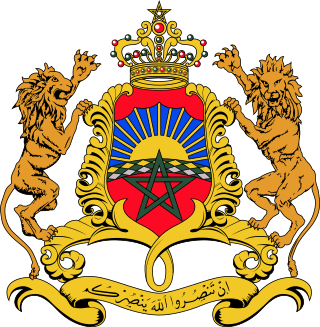
Politics of Morocco take place in a framework of an official parliamentary semi-constitutional monarchy, whereby the prime minister of Morocco is the head of government, and of a multi-party system. Executive power is exercised by the government. Legislative power is vested in both the government and the two chambers of parliament, the Assembly of Representatives of Morocco and the Assembly of Councillors. The Moroccan Constitution provides for a monarchy with a Parliament and an independent judiciary.
The Socialist Union of Popular Forces is a social democratic political party in Morocco.

The 1999 European Parliament election was the United Kingdom's part of the European Parliament election 1999. It was held on 10 June 1999. Following the European Parliamentary Elections Act 1999, it was the first European election to be held in the United Kingdom where the whole country used a system of proportional representation. In total, 87 Members of the European Parliament were elected from the United Kingdom across twelve new regional constituencies.
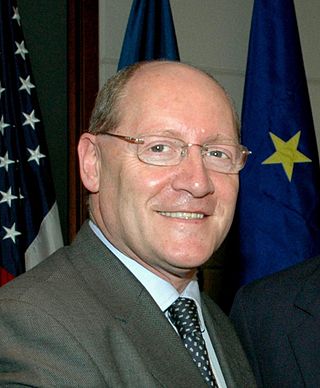
The 2004 European Parliament election was the United Kingdom's part of the wider 2004 European Parliament election which was held between 10 and 13 June 2004 in the 25 member states of the European Union. The United Kingdom's part of this election was held on Thursday 10 June 2004. The election also coincided with the 2004 local elections and the London Assembly and mayoral elections. In total, 78 Members of the European Parliament were elected from the United Kingdom using proportional representation.

The Istiqlal Party is a political party in Morocco. It is a conservative and monarchist party and a member of the Centrist Democrat International and International Democracy Union. Istiqlal headed a coalition government under Abbas El Fassi from 19 September 2007 to 29 November 2011. From 2013 to 2021, it was part of the opposition. Since 2021 it is part of a coalition government led by Aziz Akhannouch.

The 2010 United Kingdom general election was held on Thursday 6 May 2010, to elect Members of Parliament to the House of Commons. The election took place in 650 constituencies across the United Kingdom under the first-past-the-post system. The election resulted in a large swing to the opposition Conservative Party led by David Cameron similar to that seen in 1979, the last time a Conservative opposition had ousted a Labour government. The governing Labour Party led by the prime minister Gordon Brown lost the 66-seat majority it had previously enjoyed, but no party achieved the 326 seats needed for a majority. The Conservatives won the most votes and seats, but still fell 20 seats short. This resulted in a hung parliament where no party was able to command a majority in the House of Commons. This was only the second general election since the Second World War to return a hung parliament, the first being the February 1974 election. This election marked the start of Conservative government for the next 14 years.

The Parliament of Morocco is the bicameral legislature of Morocco. It is located in Rabat.

Legislative elections were held in France on 10 June and 17 June 2007 to elect the 13th National Assembly of the Fifth Republic, a few weeks after the presidential election run-off on 6 May. 7,639 candidates stood for 577 seats, including France's overseas possessions. Early first-round results projected a large majority for President Nicolas Sarkozy's Union for a Popular Movement (UMP) and its allies; however, second-round results showed a closer race and a stronger left. Nevertheless, the right retained its majority from 2002 despite losing some 40 seats to the Socialists.
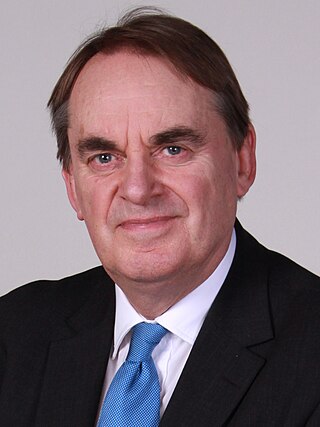
The 2009 European Parliament election was the United Kingdom's component of the 2009 European Parliament election, the voting for which was held on Thursday 4 June 2009. The election was held concurrently with the 2009 local elections in England. In total, 72 Members of the European Parliament were elected from the United Kingdom using proportional representation.

General elections were held in Morocco on 27 September 2002. The elections were the first since King Mohammed VI of Morocco had come to the throne in 1999 and international observers saw it as a test of his commitment to democracy. The election saw an Islamist party the Justice and Development Party make strong gains but the outgoing government kept a majority in the Assembly of Representatives.
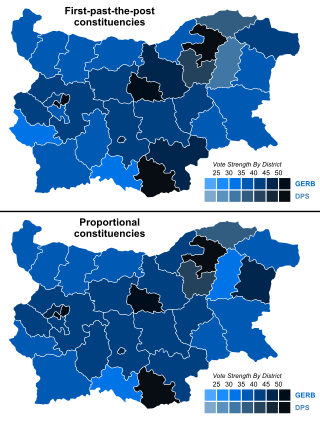
Parliamentary elections were held in Bulgaria on 5 July 2009. With 40% of the vote, the decisive winner of the elections was the established in 2006 personalistic party of Boyko Borisov, GERB. The Socialist Party, in power before the election, was in second place, with around 18%. Оnce-ruling National Movement Simeon II did not cross the 4% threshold and won no seats. The turnout was 60.6%, one of the lowest ever. Following the election, GERB leader Boyko Borisov became prime minister. Just like all the previous parliamentary elections since the fall of communism, the government was not re-elected.

There are five types of elections in the United Kingdom: elections to the House of Commons of the United Kingdom, elections to devolved parliaments and assemblies, local elections, mayoral elections, and police and crime commissioner elections. Within each of those categories, there may also be by-elections. Elections are held on Election Day, which is conventionally a Thursday, and under the provisions of the Dissolution and Calling of Parliament Act 2022 the timing of general elections can be held at the discretion of the prime minister during any five-year period. All other types of elections are held after fixed periods, though early elections to the devolved assemblies and parliaments can occur in certain situations. The five electoral systems used are: the single member plurality system (first-past-the-post), the multi-member plurality, the single transferable vote, the additional member system, and the supplementary vote.

Parliamentary elections were held in Poland on 9 October 2011. All 460 members of the Sejm and 100 senators of the Senate were elected. The ruling Civic Platform (PO) won a plurality of seats and Tusk became the first Polish prime minister to be appointed for a second consecutive term since the fall of communism. Both the Civic Platform and its junior partner, the Polish People's Party (PSL), agreed to continue their governing coalition after the election.

The 2007 National Assembly for Wales election was held on Thursday 3 May 2007 to elect members to the National Assembly for Wales. It was the third general election. On the same day local elections in England and Scotland, as well as the Scottish Parliament election took place. This election was preceded by the previous Assembly election in 2003.

Early general elections were held in Morocco on 25 November 2011, brought forward from 2012 and then postponed from 7 October 2011.

Parliamentary elections were held in Iran on 26 February 2016 to elect members of the Islamic Consultative Assembly for all seats in the 10th parliament in the Islamic Republic era and the 34th since the Persian Constitutional Revolution. A second round was held on 29 April 2016 for some constituencies where candidates failed to obtain the required minimum 25 percent of votes cast. The elected MPs served from 28 May 2016 to 27 May 2020.

General elections were held in Morocco on 7 October 2016. The ruling Justice and Development Party remained the largest party, winning 125 of the 395 seats in the House of Representatives, a gain of 18 seats compared to the 2011 elections.
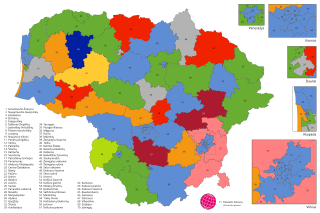
Parliamentary elections were held in Lithuania on 11 and 25 October 2020 to elect the 141 members of the Seimas. 71 were elected in single-member constituencies using the two-round system, and the remaining 70 in a single nationwide constituency using proportional representation. The first round was held on 11 October and the second round on 25 October.

Legislative elections were held in Iran on 21 February 2020, four years after the previous legislative election in 2016. Due to the COVID-19 pandemic in Iran, the second round, to elect eleven seats, was postponed until 11 September 2020.

General elections were held in Morocco on 8 September 2021 to elect 395 members of the House of Representatives. The National Rally of Independents led by Aziz Akhannouch won the most seats (102), a gain of 65 seats from the prior election. The liberal Authenticity and Modernity Party took second place with 87 seats, a net loss of 15 seats. The centre-right Istiqlal Party gained 35 seats and took third place with 81 seats total. The governing Justice and Development Party suffered an electoral wipeout and won only 13 seats, a net loss of 112 seats for the party.















